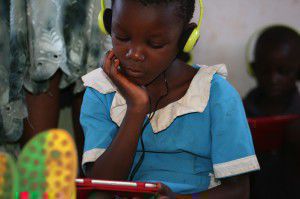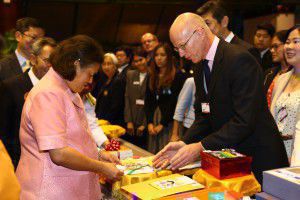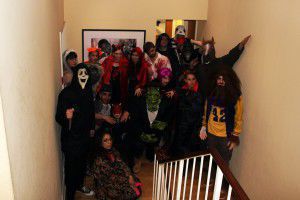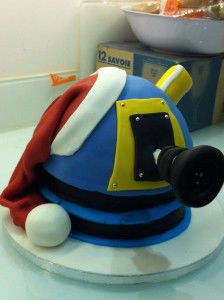EuroTalk: a look back at 2013
It’s been another busy year at EuroTalk, with new products, new languages… and a new puppy. Throw in a royal encounter and a cake that looks like a Dalek, and you’ve got the makings of an interesting twelve months.
Languages
In June, we launched our new app for iPhone and iPod touch, uTalk. This had been in development for a long time, and we were really proud and excited to be able to share it with the world. It’s got more content and more activities, and it’s free to download and start learning the essential words you need to get by in 60 languages. We’ve been adding more languages regularly since the app was launched, and will continue to do so over the coming months. So if we haven’t yet got the language you need, don’t worry – we soon will.
And that’s not all. Last month, we added Lao, the official language of Laos and also spoken in the north east of Thailand, to our range with the release of Talk Now, our beginner program for PC and Mac. Lao has about 15 million speakers worldwide, and is a language we’ve been wanting to offer for some time now. There are more new languages on the way in 2014, so watch this space…
Maths
This year also saw the launch of part 2 of our second maths app, Maths, age 4-6, and two new practice apps – Count to 10 and Count to 20. We also released a version of Maths age 3-5, for schools, so teachers can use the app in the classroom.
Malawi
We’ve been working in Malawi now for several years, as part of our mission to ensure one billion primary age children reach their full potential in numeracy, reading and English. This year, Dr Nicola Pitchford from the University of Nottingham conducted an evaluation at Biwi Primary School in Malawi, to measure how effective our maths apps are for the children’s learning, compared to other teaching methods, including other apps. The preliminary results show that not only did the group using our apps perform significantly better than the other groups, but in fact they tripled their maths knowledge in just eight weeks. This is really exciting and encouraging, and we hope now to scale up the project in Malawi to reach more children, in more schools.
Junior Language Challenge
2013 saw the return of the JLC, after a year off in 2012. Our annual language learning competition for primary age children across the UK is always very popular, and this year was no exception. We were joined at the final by Martha Payne of NeverSeconds, who at just 10 years old, has raised over £140,000 for Mary’s Meals, a charity providing school dinners to children in Malawi. Martha, with her dad and her sister, was our special guest and handed out the prizes to our finalists, including the JLC Champion for 2013, Ella Whittingham from West Bridgford, Nottingham.
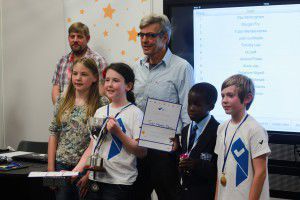
Martha Payne with JLC Champion Ella Whittingham, runners-up Morgan Fry and Tudor Mendel-Idowu, and EuroTalk Chairman Richard Howeson
A Royal Visit
In October, Steve was honoured by a visit from Her Royal Highness Princess Maha Chakri Sirindhorn of Thailand, while at an exhibition in Bangkok. The Princess came to have a look at the EuroTalk stand, and later Steve presented her with a gift on behalf of the company. He had to be instructed on the correct way to bow, and fortunately he got it right!
New arrivals
This year, we’ve said a sad goodbye to Glyn, Tom and Hanna, but welcomed Safia, Seb and Pablo. We’ve also been lucky to have Lorena with us from Germany for a few months; you may have enjoyed some of her blog posts! And in August we welcomed Molly the puppy, who caused a certain amount of mayhem, but was very easily forgiven because she’s so cute.
Fancy dress fun
We entered into the ‘spirit’ of Halloween by getting dressed up for the occasion. With everything from vampires to skeletons, pumpkins to werewolves, we were quite a sight to behold. Although some of us were scarier than others…
Lots of cake
We’ve always enjoyed a bit of cake here at EuroTalk, but this year we’ve been thoroughly spoilt, with keen bakers Safia and Alex (but mostly Safia) providing us with masterpieces like this amazing Dalek cake. (It took us three days to eat, but it was totally worth it.)
And so the year has come to an end in style. Thanks as always for reading our blog, and to our guest bloggers who’ve been in touch over the last year. Please do contact us if you have something you’d like to share!
Happy New Year, everyone – see you in 2014!
Learning a language – our top 10 tips
We all know learning a language is a great idea, but sometimes it can be hard to get motivated or to find the right way to learn. Here are our top 10 tips to help you get started.
1. Tell everyone you know that you’re learning a language.
This way, when you’re tempted to give up or chicken out, you might think twice knowing they’re all expecting great things from you. I call this ‘the biscuit tin method’; if you tell everyone you’re giving up biscuits, you’re a lot less likely to cave, just in case you get caught with your hand in the tin. It worked for me – I haven’t had a biscuit in years. Well, not out of the tin, anyway.
2. Start with the basics.
We know you might be learning French for an important business meeting, but you may not get a chance to show off the fact that you know how to say ‘Sales in the retail sector are growing steadily’, if you’ve not yet learnt how to say ‘hello’.
3. Don’t be scared to talk to people.
You might get it wrong sometimes, but if you don’t try, you’ll never get it right, either. In the immortal words of Richard Branson, ‘You don’t learn to walk by following rules. You learn by doing, and falling over.’ Learning on paper is all well and good, but talking to people and making mistakes is the best way to pick new things up. And you’re more likely to get it right next time, because you’ll remember the situation you were in as well as just the word or phrase.
(This works both ways, actually – if you know someone who’s learning your language and they say something incorrectly, let them know about it. Not in a mean way, but in a helpful, constructive way so they understand where they went wrong and can get it right next time. And you’ll probably find it helps you understand your own language better, too.)
4. Don’t worry too much about grammar to begin with.
Yes, it’s important, but if you’re making the effort to talk to someone in their own language, as long as you can make yourself understood, they probably won’t mind if you get your verb ending wrong. So get your basic vocab and some stock phrases down first, then you can start learning some basic grammar to help you create your own sentences and take your study of the language further.
5. Make yourself some flashcards.
Or use a computer program or mobile app. (We hear uTalk‘s quite good…) Introducing an element of competition can be a good motivator, so see if you can team up with someone else who’s learning the same language and test each other, or compare your online scores. If you don’t have time to sit down and make flashcards, you could try labelling things around your house or workspace, so you see them all the time and the vocabulary will start to sink in without you even realising.
6. Find someone to talk to.
If you’re learning for a trip, then this is easy; there’ll be loads of people to chat to when you get there. But if you’re just learning for fun, try and find someone to practise with. A lot of the world is so multicultural now that it’s possible to find a native speaker of just about any language living just down the road. But even if you can’t, there are loads of websites where you can find someone to Skype with, even if they live on the other side of the world. For instance, italki is free and lets you connect with language teachers and native speakers around the world. The best part is, you might make a new friend, which can only mean one thing – cheap holidays…
7. Read, watch and listen to anything you can find.
If you’re at home, this could be newspapers, books, movies, music or websites. Or if you’re travelling, look at signs, menus or product packaging. If there are words you don’t understand, make a note of them and look them up later, or ask someone. You’ll probably be surprised how much you can piece together on your own, and that’s a great confidence boost.
8. Go to the country.
Even if you’re just learning for fun, there’s no better way to learn a language than to immerse yourself in it. Plan a holiday – if nothing else it’ll give you something to look forward to and will motivate you to keep learning. Visiting a country also means that you’ll learn the ‘real’ way of saying things – you might have learnt the correct way but when you arrive, you’ll find nobody actually talks that way.
9. Don’t give up.
It’s not easy to learn a language, but we all have the ability. There really is no such thing as someone who’s bad at languages. So if you’re finding it difficult, hang in there; it’ll be worth it in the end. And keep practising, because you may find all that vocab you spent ages learning will drift away if you don’t. Which seems like a shame.
10. Enjoy it.
We all remember our school days, studying French verbs and monotonously repeating meaningless sentences about your cats on tables. But learning a language can open up a world full of opportunities, new friends and different ways of seeing the world around us. So why make it a chore? Be creative – everyone’s different so do whatever works for you. You could try singing, for example. Or blogging about your learning journey. Try different things and see what works. And then tell us about it – we’d love to hear from you 🙂
Good luck!
Liz (with contributions from Alex and Nat)
You can now read and share this post in a handy infographic!
What language is spoken in France?
A quick quiz question for you: what language is spoken in France?
Answer: well, French of course! But did you know France is also home to several small regional languages, including Alsatian, Catalan, Breton and Occitan?
 Like many other European countries, the French once spoke a wide range of regional languages and dialects. However, during the Third Republic, the French government made French the only official language, and outlawed use of regional languages such as Breton and Occitan in schools and institutions. The underlying idea of creating national and linguistic unity may have been well-intentioned, but as a result, most of these regional languages are now endangered.
Like many other European countries, the French once spoke a wide range of regional languages and dialects. However, during the Third Republic, the French government made French the only official language, and outlawed use of regional languages such as Breton and Occitan in schools and institutions. The underlying idea of creating national and linguistic unity may have been well-intentioned, but as a result, most of these regional languages are now endangered.
Nowadays, Occitan is spoken by around 1.33% of the population (in the Occitania region in Southern France), whilst Breton is spoken in Brittany by around 0.61% of the population. These languages are recognised by the government, but not considered official languages, and therefore given minimal support and opportunity for use.
The situation is a little more encouraging in Spain, where Basque, Catalan, Valencian and Galician are recognised as co-official regional languages, and a thriving community of native speakers exists in each of these regions.
This rather cool map shows how the areas over which each of these languages is/was spoken has changed over the last 1,000 years.
Over time, due to globalisation, mass media and government drives for national unity, the national languages in Spain, France and many other countries have established dominance and pushed smaller regional languages onto the sidelines. However, there are still communities of native speakers of each of these languages, and many people are passionate about passing on the language and culture of their region to the next generation.
Regional languages are often closely tied to the culture and identity of a region: the Catalonians I know are proud Catalan speakers, and often much of an area’s history, literature, music and so on is written in the regional language. These languages may be small, but they are certainly worth learning and preserving!
In fact, we have produced our Maths, age 3-5 and 4-6 apps in both Basque and Catalan, and uTalk is currently available in Galician, Basque and Catalan. And for anyone interested in regional French languages, why not learn a few phrases for free in Occitan, Breton, Alsatian or Provencal?
Alex
Pure and simple?
Recently, Alex wrote about the way languages borrow words from each other. She pointed out that in English, we’re always using words from other languages, sometimes without even realising it, with déjà vu, karate and Zeitgeist being just a few examples.
But is this mixing of languages a good thing, or should languages remain ‘pure’?
Hoji Takahashi, a 71-year-old man from Japan, hit the headlines a few weeks ago when he sued the country’s public TV station, NHK, for the mental distress he’s suffered as a result of them using too many words derived from English. A couple of the examples given were toraburu (trouble) and shisutemu (system).
He’s not alone – many elderly Japanese people have trouble understanding these ‘loan words’, and the government has apparently been under pressure for over ten years to try and do something about the dominance of American English in Japan, which has been growing ever since World War II.
The lawsuit is quite controversial, with some dismissing it as ridiculous and others giving Mr Takahashi their full support. But whatever your view, it does raise an interesting question – one that we at EuroTalk often face when translating the vocabulary for our software. Should we go with the word that people most often use, or the one that’s technically correct in the original language?
It’s a difficult decision, particularly when translating for people who want to learn a language, because we know that we have a responsibility to get it right; language learners are putting their faith in us to teach them the correct words, so they’ll be able to speak to people and won’t be embarrassed by saying the wrong thing. But at the same time, the ‘correct’ word might not be the one that they’ll actually need when they get to wherever they’re going. This is particularly the case with African languages, where many words are adapted from French, and indigenous South American languages, where the Spanish influence is very clear. And it can be frustrating for someone who’s just starting to learn a new language to find that half the words are not actually in that language at all.
A few examples:
– In Maltese, the correct word for ‘airport’ is ‘mitjar’, but everyone says ‘arjuport’.
– In Swahili, although ‘tomato’ is ‘nyanya’, ‘tomato ketchup’ is known as ‘tomato’, although the technically correct translation is ‘kechapu ya nyanya’.
– In Tumbuka, when counting to 20, Tumbuka numbers are used, but beyond 20 the numbers revert to English.
There are many more examples, as we’ve discovered over the years and particularly when working on the translations for the new uTalk app. Each new translation is carefully considered and discussed to decide on the best choice from a practical point of view, selecting the word most people would actually use in real life – even if this means some people, like Mr Takahashi, don’t agree with the final result.
What do you think? Should language learning software teach a language in its purest form, or is it better to learn the words that are most commonly used, even if they’re borrowed from another language?
Liz
Lost in translation: making sense of maths
Reading Nat’s post about all the fascinating linguistic differences and difficulties that she and her translators experienced when translating the new uTalk app, I was reminded of some of the similar issues we’ve had in localising the maths apps. What seems totally normal to a three-year-old in the UK might not be all that familiar to a kid in Malawi, for a start! Not to mention the fact that (unfortunately for us English speakers), not all languages follow our grammar rules. Here are a few of the cultural and language localisation issues we’ve come across recently…
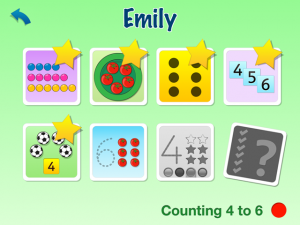 In Swedish, there were a couple of interesting language differences, for example: you cannot use the same word for ‘height’ in Swedish for an object such as a house as for a person (Välj det Längsta barnet – choose the tallest child, but Välj det högsta trädet – the tallest tree), whereas in English we can say short or tall regardless of the object.
In Swedish, there were a couple of interesting language differences, for example: you cannot use the same word for ‘height’ in Swedish for an object such as a house as for a person (Välj det Längsta barnet – choose the tallest child, but Välj det högsta trädet – the tallest tree), whereas in English we can say short or tall regardless of the object.
In Malawi, some of the ‘everyday’ objects featured in the apps probably seemed more than a little strange. In fact, Chichewa is strongly based on words for things that people see and encounter in daily life. Our translator had to get a bit creative and come up with ‘equivalent’ names for objects such as a robot (a doll in the Chichewa version), a turnip (a potato in the app), a dragon (she had to use a description meaning ‘a fierce animal’) or a fridge (replaced by a cupboard). There are also many more ‘technical’ words which don’t exist in traditional Chichewa, such as shapes. These are therefore normally given English names with a slight Chichewa accent (sikweya, trayango, rekitango and so on).
This is quite similar in Wolof: many items simply do not have a name in Wolof, or the words are unfamilar to most young people. Many items are therefore named in French instead, such as animals (giraffe), shapes (cercle) or fruits (banane). Above about 10, Wolof-speakers also tend to revert to French numbers instead of the more complex Wolof system (similar to the Chichewa – 5 and 1, 5 and 2…).
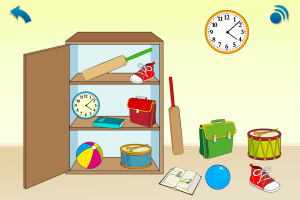 As with the uTalk app, Polish proved an especially problematic language for us too. One of the biggest issues was that in Polish the word for ‘you’ is dependent on gender. The translator mainly dealt with this by saying ‘we’ (e.g. Nauczyliśmy się/robiliśmy – we learned/were learning how to…), rather than addressing the child playing the app as male or female. It is also not usual to use prepositions such as ‘inside’ and ‘outside’ when describing the location of an object. e.g. instead of saying ‘the book is outside the cupboard’, Poles would normally say ‘the book is not in the cupboard’. Similarly to many other languages, some of the objects were also not very familiar: a cricket bat is not a well-known object, so it was translated as kijek – a little bat, and mangoes were translated as owoce – a fruit, as mangoes are not a ‘usual’ fruit in Poland – the same was the case with the Hungarian app, where we translated mango as gyumolc – also a generic word for fruit.
As with the uTalk app, Polish proved an especially problematic language for us too. One of the biggest issues was that in Polish the word for ‘you’ is dependent on gender. The translator mainly dealt with this by saying ‘we’ (e.g. Nauczyliśmy się/robiliśmy – we learned/were learning how to…), rather than addressing the child playing the app as male or female. It is also not usual to use prepositions such as ‘inside’ and ‘outside’ when describing the location of an object. e.g. instead of saying ‘the book is outside the cupboard’, Poles would normally say ‘the book is not in the cupboard’. Similarly to many other languages, some of the objects were also not very familiar: a cricket bat is not a well-known object, so it was translated as kijek – a little bat, and mangoes were translated as owoce – a fruit, as mangoes are not a ‘usual’ fruit in Poland – the same was the case with the Hungarian app, where we translated mango as gyumolc – also a generic word for fruit.
In Portuguese, there is no real way to distinguish between ‘more’ and ‘most’ or ‘less’ and ‘least’. Mais means both more and most, and menos less/least/fewer/fewest. This is also the case in Welsh: ‘bigger’ and ‘biggest’ translate to mwy and mwyaf respectively, but ‘more’ and ‘most’ also translate to mwy and mwyaf. The same goes for ‘smaller’/’smallest’ and ‘less’/’least’ (llai, lleiaf). On the other hand, there are different words for top and bottom shelves. Generally ‘top’ and ‘bottom’ are top and gwaelod but ‘top shelf’ and ‘bottom shelf’ are silff uchaf and silff usaf.
I was also intrigued to find out that in Amharic (an African language spoken in Ethiopia), they have a completely different system for telling the time: ‘1 o’clock’ does not mean lunch time, it in fact means ‘the first hour of the day’, i.e. when the sun comes up, and the rest of the day is counted from there. In fact, “Telling the time’ has been one of the hardest topics to localise, as our ideas of what happens at what time are not exactly international. Our French translator not only found the idea of eating a boiled egg for breakfast rather funny, but also pointed out that schools finish at 5 in France, not 3 as in the app, and a child would eat dinner at 7 or 8, not at 5 or 6! In Spain this is even funnier, as Spanish children regularly eat their dinner at 9 p.m., and go to sleep at 10 p.m. or perhaps later at the weekend or on holiday.
These are just a few of the language and cultural issues we’ve encountered on the maths translation project, and there are sure to be more! We have 10+ new languages ready to be released, and many more in the pipeline, so watch this space!
Alex
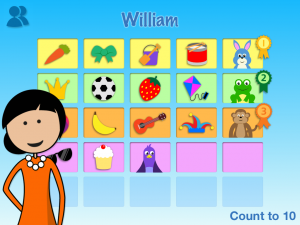 The maths apps are available from the App Store: Maths, age 3-5 and Maths, age 4-6.
The maths apps are available from the App Store: Maths, age 3-5 and Maths, age 4-6.
And also now available (in English only for the time being), Counting to 10, our first maths practice app, is on sale in the iTunes App Store for iPhone, iPod touch and iPad, and Google Play, for Android devices.

